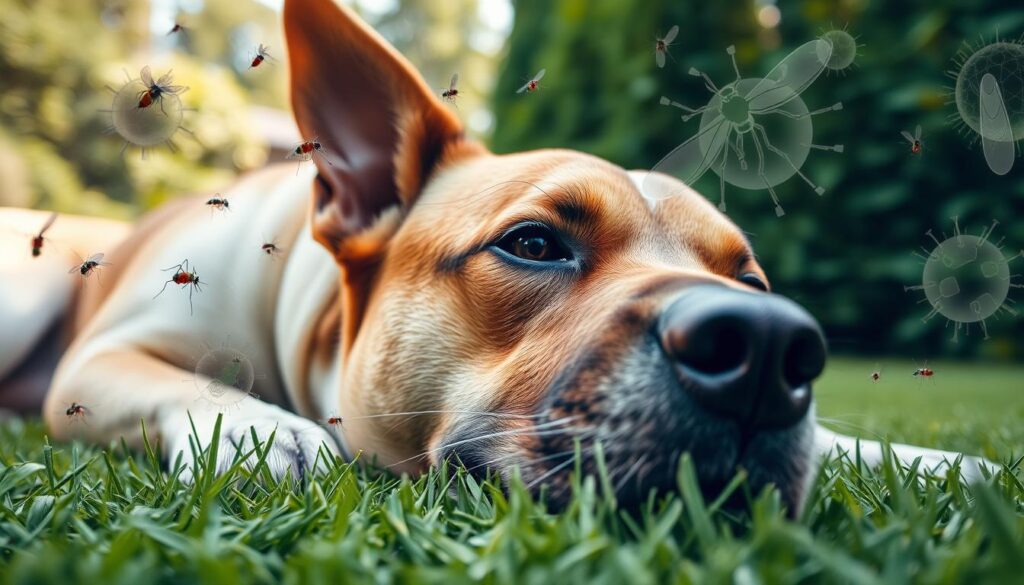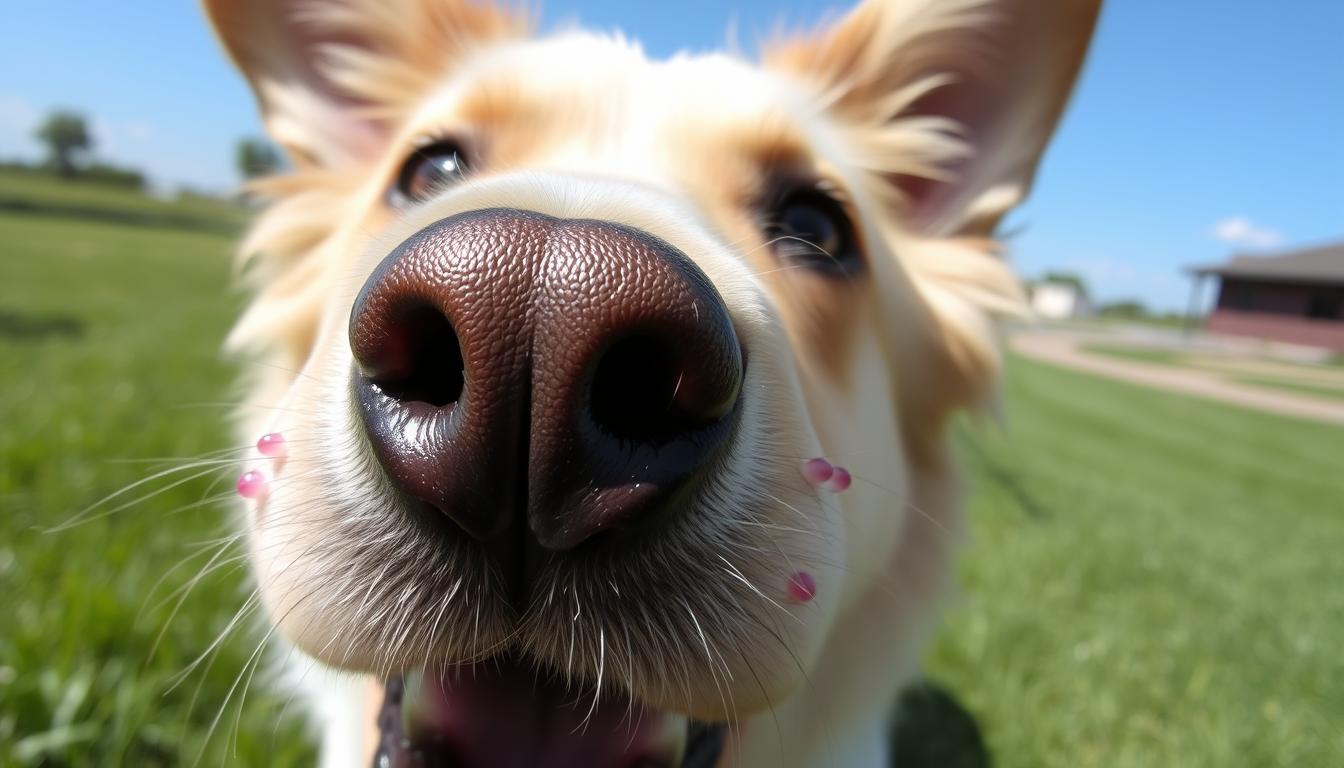As a pet parent, the thought of your dog getting mosquito bites is worrying. Dogs are not safe from these pests. Mosquitoes can get through a dog’s fur, especially around the nose, ears, and belly.
This can cause discomfort, itching, and even health problems like heartworm disease. In this guide, we’ll look at how mosquito bites affect dogs. We’ll cover symptoms, risks, and how to prevent them. This way, your dog can enjoy the outdoors without mosquito trouble.
As a caring pet parent, your main goal is your dog’s health. Knowing about mosquito bites helps you protect your dog. We’ll share important information to keep your dog safe and happy all year round.
Table of Contents
Understanding Mosquito Bites in Dogs
As the weather gets warmer, dog owners should watch out for mosquitoes. These insects can bother your dog and even spread diseases like heartworm. Knowing how mosquitoes find and bite dogs is key to keeping them safe.
How Mosquitoes Find and Bite Dogs
Mosquitoes find dogs by smelling their carbon dioxide and other scents. They then use their sharp proboscis to bite and drink blood. Dogs’ ears, nose, belly, and groin are favorite spots for these bites.
Where Dogs Most Commonly Get Bitten
Even though a dog’s fur offers some protection, it’s not enough. Mosquitoes can get to the skin through less hairy spots. These areas, like the underside and around the eyes and ears, are their go-to spots.
Why Fur Doesn’t Fully Protect Dogs
A dog’s fur might seem like a shield, but it’s not foolproof. Mosquitoes can get through the fur to find skin to bite. Some dogs with shorter fur are even more at risk. Knowing this helps owners protect their pets from mosquito bites during mosquito season.
Can Dogs Get Mosquito Bites: The Simple Truth
The simple truth is that dogs can and do get mosquito bites. These bites are not only a nuisance but can also transmit diseases. Dogs are susceptible to mosquito bites in various environments, especially during peak mosquito seasons. Pet owners should be vigilant and take appropriate measures to protect their dogs from these pesky insects.
Mosquito bites on dogs can be visible as raised red skin lesions and can transmit heartworm disease. The use of bug repellent sprays for dogs is advised to deter mosquitoes. Additionally, dogs can also be affected by other types of bug bites, such as:
- Fleas, causing skin irritation and itching
- Ticks, which can attach and feed on the dog’s blood
- Mites, like Sarcoptic mange, leading to fur loss and itching
- Bees, wasps, and hornets, causing pain, swelling, and allergic reactions
- Fire ants, resulting in painful bites and potential allergic reactions
- Venomous spiders, which can have severe consequences if bitten
When a dog is bitten by an insect or spider, monitoring for allergic reactions and applying cold compresses can help reduce swelling. If the dog shows signs of distress, lethargy, or breathing difficulties, contacting a vet is crucial for guidance on the next steps.
In summary, dogs are susceptible to mosquito bites and various other bug bites, which can lead to skin irritation, disease transmission, and potentially severe reactions. Pet owners should be proactive in using appropriate repellents and seeking veterinary care when necessary to ensure their furry companions’ well-being.
Identifying Mosquito Bite Symptoms in Dogs
As a pet parent, knowing the signs of mosquito bites in dogs is crucial. Mosquito bites can show up as small, red welts. These often appear on areas like the ears, belly, and inner legs, where there’s less fur.
Visual Signs of Mosquito Bites
Look out for small, raised, red bumps on your dog’s skin. These could be from a mosquito bite. Since these bites are often in areas with less fur, they’re easier to spot.
Your dog might scratch, lick, or rub the affected areas a lot. This is their way of trying to get rid of the itchiness.
Behavioral Changes After Being Bitten
After being bitten, your dog’s behavior might change too. They might scratch, lick, or rub the itchy spots a lot. This shows they’re uncomfortable and itchy.
Some dogs might get more agitated or restless. They might find it hard to relax because of the itchiness from the bites.
Allergic Reaction Symptoms
Some dogs can have a more serious reaction to mosquito bites. This can include hives, itching all over, or even skin inflammation. If your dog shows any of these signs, get them to the vet right away.
By watching for these signs, you can spot and treat mosquito bites quickly. This helps keep your dog comfortable and safe.
Health Risks Associated with Mosquito Bites
Mosquito bites might seem harmless, but they can be dangerous for dogs. They can carry mosquito-borne diseases in dogs, like heartworm disease. This is a serious condition.
Heartworm disease is caused by long worms that live in a dog’s heart and blood vessels. Dogs with this disease may cough, feel tired, lose weight, and have trouble breathing. Treatment can be expensive and long.
While rare in cats, heartworm disease is still a risk. Even young worms can harm a cat’s lungs and immune system. Cats may cough, vomit, have trouble breathing, and feel very tired. There’s no cure for cats.
Mosquitoes can also spread other diseases to dogs, like West Nile Virus. But this is less common. Mosquito bites can also cause allergic reactions in dogs and cats. This leads to swelling, redness, and intense itching, especially on the face, ears, and nose.
Another problem is secondary skin infections. Excessive scratching or biting from mosquito bites can cause redness, swelling, pus, and discomfort. Dogs with sensitive skin or a tendency to scratch are more likely to get these infections.
To avoid these health risks and prevent mosquito bites in dogs, vets suggest several steps. They recommend using heartworm prevention all year, regular vet visits, and controlling mosquitoes. This includes getting rid of standing water and using safe repellents for pets.

Understanding Heartworm Disease in Dogs
Heartworm disease is a serious and potentially fatal condition caused by the parasitic roundworm Dirofilaria immitis. It is mainly spread through mosquito bites. This makes it a big worry for pet owners, especially in areas with lots of mosquitoes.
How Heartworms are Transmitted
When an infected mosquito bites a dog, it can pass the heartworm larvae into the dog’s skin and tissues. Over time, these larvae grow into adult heartworms. They then move to the dog’s heart and lungs, leading to serious health issues.
Signs of Heartworm Infection
Early signs of heartworm disease in dogs include a persistent cough and trouble exercising. They may also lose their appetite and weight. As the disease gets worse, symptoms can get even more severe, like chronic cough, fatigue, and even heart attacks.
Prevention and Treatment Options
Preventing heartworm disease is key. This can be done with FDA-approved monthly preventatives. These come in pills, topical treatments, or annual injections like ProHeart 12. Regular annual heartworm testing and staying on prevention are recommended, as false negatives can happen, especially if only male worms are present.
If a dog is found to have heartworm disease, treatment is available but it’s risky and costly. Treatment usually involves drugs like melarsomine and ivermectin. Early detection and prevention are crucial to keep dogs safe from this deadly disease.
Treating Mosquito Bites on Your Dog
Dealing with mosquito bites on your dog can be a worry, especially in warmer months. These bites are usually not harmful but can be itchy and irritating. Luckily, there are ways to treat and manage these bites.
To start, you can ease the itching and swelling. A cold compress or ice pack can help. You can also use a baking soda and water paste to dry out the bite and cool it down.
If the bite has caused open wounds from scratching, clean the area carefully. Use dog-friendly soap and warm water. This helps prevent infections and aids in healing.
For severe mosquito bite allergies in dogs, or if symptoms get worse, see a vet. They might give your dog medication to ease the discomfort. This could be topical or oral.
Watch your dog closely for signs of an allergic reaction. Look for excessive scratching, swelling, or trouble breathing. If you see these, call your vet right away.
Acting quickly and following treatment advice can help your dog feel better. Always talk to your vet about your dog’s health and any issues.
Natural and Medical Solutions for Bite Relief
Dealing with mosquito bites on your dog can be frustrating. Luckily, there are safe home remedies and medical solutions to help. Knowing the right approach keeps your dog comfortable and healthy.
Safe Home Remedies
For mild bites, simple home remedies work well. A cold compress can reduce swelling and itching. Dog-friendly treatments like aloe vera gel or hydrocortisone creams also help soothe the skin.
But, avoid using human insect repellents with DEET. These can be harmful to dogs.
When to Seek Veterinary Care
If your dog has a severe reaction or symptoms don’t go away, see a vet. A vet can check the bites and give the right medicine. This might include antihistamines or ointments to help.
In some cases, they might also treat allergies or skin issues. Protecting your dog from bites and treating them quickly is key. This way, you can manage this common problem effectively.
Effective Prevention Strategies
To keep your dog safe from mosquito bites, you need a few steps. Preventing mosquito bites in dogs is key for their comfort and health. It helps avoid diseases spread by mosquitoes.
Using mosquito repellents for dogs is a great way to protect them. Look for EPA-registered products with DEET, Picaridin, or Oil of Lemon Eucalyptus. These are safe and work well. Always check with your vet before trying new products. Some, like permethrin, can harm cats.
- Think about dog-specific sprays, collars, or topical solutions. They have ingredients like permethrin, deltamethrin, or fipronil to keep mosquitoes away.
- Put up mosquito traps around your home to cut down on these pests.
- Don’t use natural repellents like essential oils on dogs. They can be harmful if not mixed right.
Keeping your area mosquito-free is also important. Regular grooming, heartworm meds, and pest control can make outdoor spaces safer. Also, remove standing water, plant repellent plants, and use citronella candles to fight mosquitoes.
| Prevention Method | Description |
|---|---|
| EPA-registered Repellents | DEET, Picaridin, and Oil of Lemon Eucalyptus are proven effective in deterring mosquitoes. |
| Dog-specific Products | Sprays, collars, and topical solutions containing permethrin, deltamethrin, or fipronil can reduce mosquito exposure. |
| Mosquito Traps | Installing mosquito traps around your property can significantly decrease the presence of these pests. |
| Heartworm Medication | Administering comprehensive heartworm medication like K9 Advantix II on a regular monthly schedule is crucial. |
| Professional Pest Control | Seeking assistance from professional pest control companies is recommended if your dog exhibits signs of distress from mosquito bites. |

Using a mix of these strategies can keep your dog safe from mosquito bites. Always talk to your vet to make sure your dog stays safe and healthy.
Seasonal Protection Tips for Dog Owners
As summer gets closer, dog owners must watch out for mosquitoes. Mosquito season is from spring to summer. It’s key to prevent bites and diseases like heartworm.
Managing Spring and Summer Risks
Limit your dog’s time outside when mosquitoes are most active. Dawn and dusk are their peak hours. Try to walk and play with your dog in the middle of the day.
Creating a Mosquito-Free Environment
- Use citronella candles or other natural mosquito repellents in your outdoor spaces to help keep the pests at bay.
- Install screens on your windows and doors to prevent mosquitoes from entering your home.
- Eliminate any standing water sources around your property, as these can serve as breeding grounds for mosquitoes.
- Consider using fans in your outdoor areas, as mosquitoes are weak flyers and will have difficulty navigating the breeze.
Keep your dog on heartworm prevention all year. This protects them from mosquito diseases, even in peak season.
Follow these tips to keep your dog safe and happy in the warmer months. It helps prevent mosquito bites and diseases.
Conclusion
As a pet owner, it’s important to know if can dogs get mosquito bites and the risks they face. Mosquitoes can harm your dog by spreading diseases like heartworm or causing allergies. To keep your dog safe, it’s key to prevent mosquito bites.
Dogs can get bitten by mosquitoes just like people do. So, it’s crucial to protect them. Use pest control, keep your yard dry, and consider safe repellents. Also, regular vet visits and quick treatment of bites are vital for your dog’s health.
Being a pet owner comes with many joys and challenges. Remember, can dogs get mosquito bites and be ready to handle it. By being informed and taking the right steps, you can ensure your dog stays safe and happy, everywhere you go.

